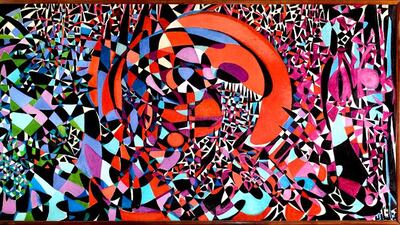Ever since it set up shop in Dubai in 2006, Christie’s Middle East has been breaking records in the region. But its forthcoming sale looks set to smash its previous achievements.
With three parts – including a new online-only section and the return of the watches, which have been absent from the market here since 2010 – this is the biggest sale the auction house has hosted in the region.
It also contains the highest-priced lot ever to go under the hammer – Break of the Atom and Vegetal Life, a 1962 five-metre oil on canvas by Fahr El-Nissa Zeid that is estimated to fetch between US$3-4 million (Dh11-14.7m). The artist is the only woman from the Arab world to have cemented her name in the abstract art movement.
And if this painting is not enough to get one excited, there are plenty more on offer. Also in the sale are sister artworks to the two most prominent pieces Christie’s Middle East has ever sold.
Oh Persepolis II, a polished bronze monolith that commemorates the ceremonial capital of the Achaemenid Empire, is a monumental work that took Parviz Tanavoli 23 years to complete. The influential Iranian sculptor made Christie’s history in 2008 when The Wall (Oh Persepolis) sold for $2.8m, a price that is still the current world auction record for any Middle Eastern artist.
Abdulnasser Gharem, the former government worker whose 2011 work Dome sold for $842,500, establishing him as the most highly valued living Saudi artist, will present The Capitol Dome, a work created in 2012.
The five-metre sculpture is a 13:1 scale replica of the Capitol dome in Washington, propped up by a miniature version of Thomas Crawford’s 19th-century statue of the armed goddess Freedom who has a rope around her neck. Questioning the very notion of freedom and liberty in a politically unstable world, Gharem’s piece is almost certain to bring him yet more accolades.
“We have really high price tags this season because we have some really special pieces,” explains Hala Khayyat, the associate director and head of sales at Christie’s Middle East. “Gharem’s work for example is a foundational, institutional piece and the others are so important.”
Khayyat also points out the other highlights of Part One of the sale, set to take place on October 29.
They include a Safwan Dahoul triptych that comments on the social situation in Syria as well as following the artist’s consistent theme of dreams; Home Sweet Home by Farhad Moshiri, whose pop art makes a comment on the superficial layers of western culture clashing with the fundamentalism present in his native Iran; and La Lutte de l’Existence by the modern Lebanese artist Paul Guiragossian.
The latter, Khayyat explains, was acquired from the personal collection of the late artist’s family and is a veritable bargain at $600,000. “The reality is that if this piece doesn’t sell, it goes back to the family and no one will get it for less than a million,” she says. “There are only 15 of this size in the world.”
These are just some of the 30 most valuable works in the first part of the sale. Part Two, set to take place the following day, will add 112 works. The third part, the online sale, has 53 lots, completing the auction house’s 15th sale season in Dubai, not including the 50 watches in the sale open to the public at the Jumeirah Emirates Towers Hotel.
Also running concurrently with the auctions is a Christie’s Education four-day programme titled Introduction to the International Art Market. It is the first time that the educational arm of the auction house has come to Dubai, offering an exceptional opportunity to anyone interested in furthering their knowledge.
“This is actually a reply to a great demand that we have been receiving for the past six years,” says Khayyat. “Every time we have the sale, people come in and ask if we do courses on art history, so we are happy to introduce this programme.”
There are international speakers talking on subjects such as the structure of the art world, the power of the collector, how to value art and the “isms” of modern art, as well as studio visits and a gallery tour.
Khayyat says she attended a similar course in 2007 that changed her life. “Before that I was so into art but I had no direction. If people are really interested in buying, then eventually they need education.”
This season is the biggest and brightest yet for Christie’s and signifies what Khayyat calls a natural progression.
“After we have been doing sales for a few years, now we feel confident that there is a demand and there is traffic and people coming through so it is time to invest in them.”
• Christie’s Modern and Contemporary Arab, Iranian and Turkish Art takes place at the Jumeirah Emirates Towers Hotel on October 29 and 30 at 7pm. Christie’s Watch sale will take place on October 29 at 8pm and the online sale will run from Thursday until November 11

